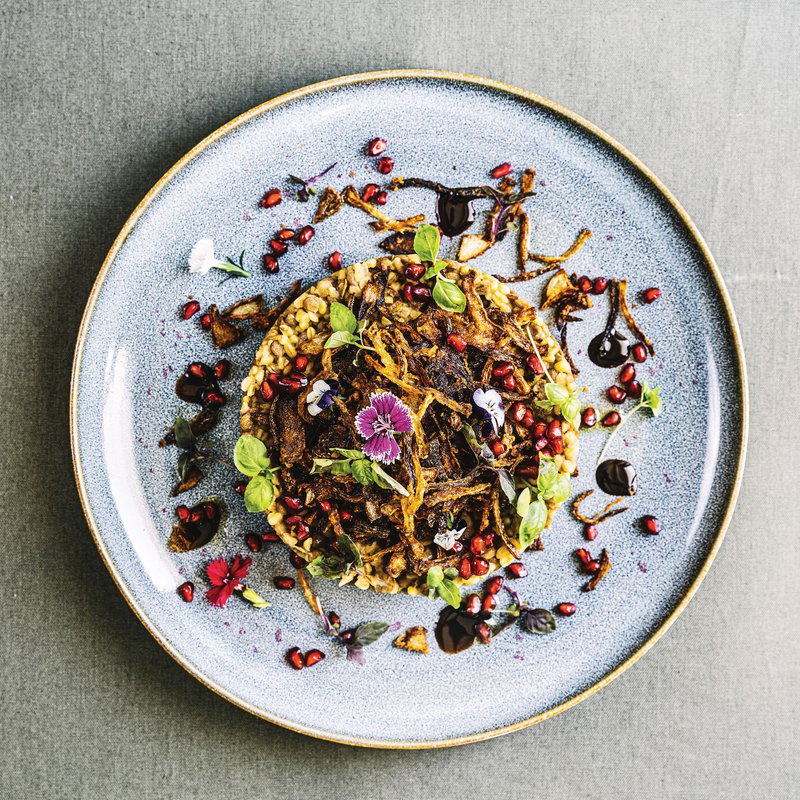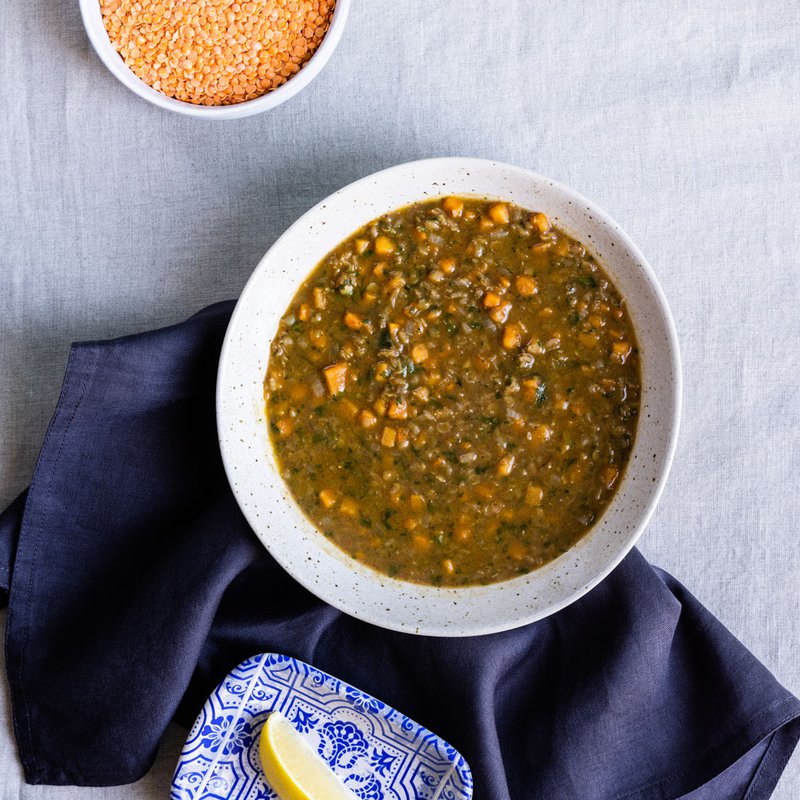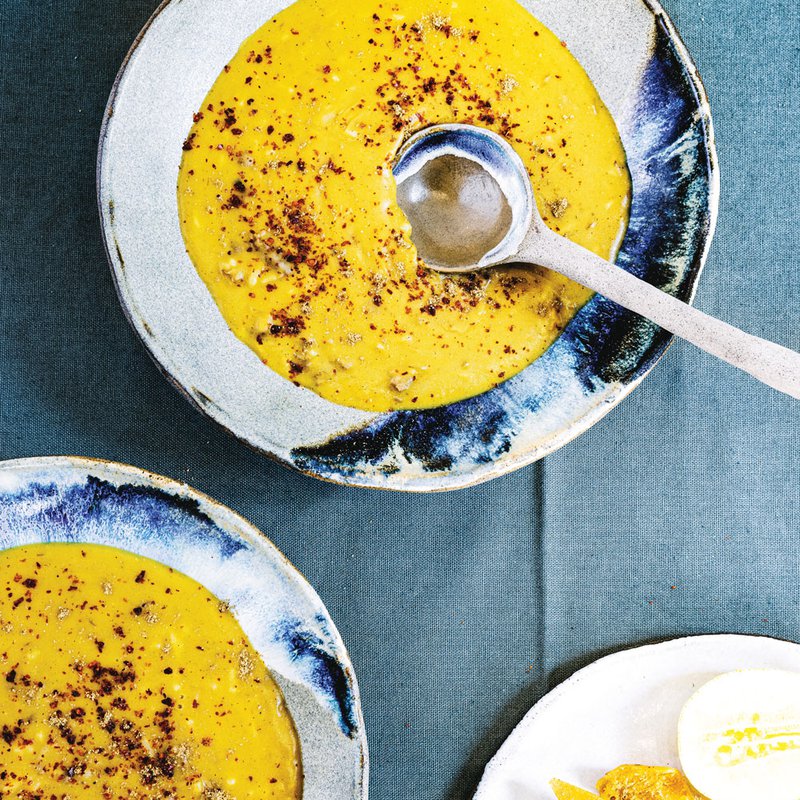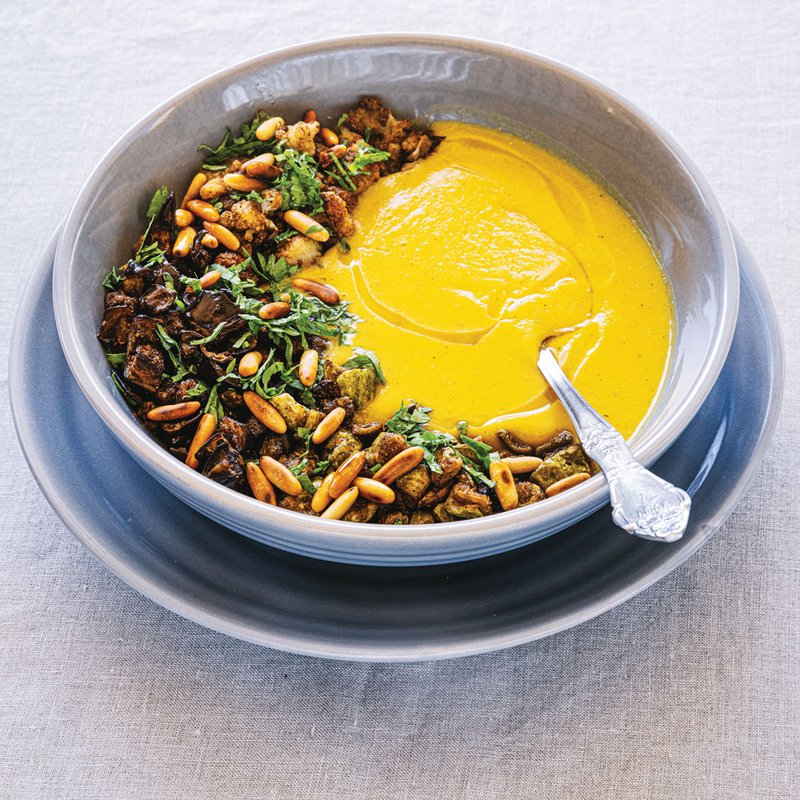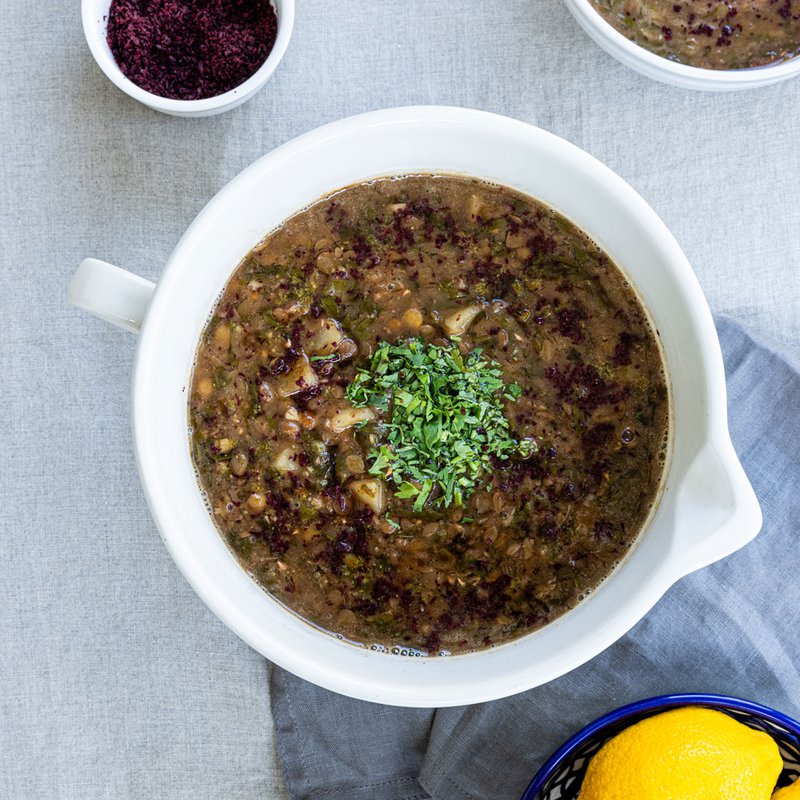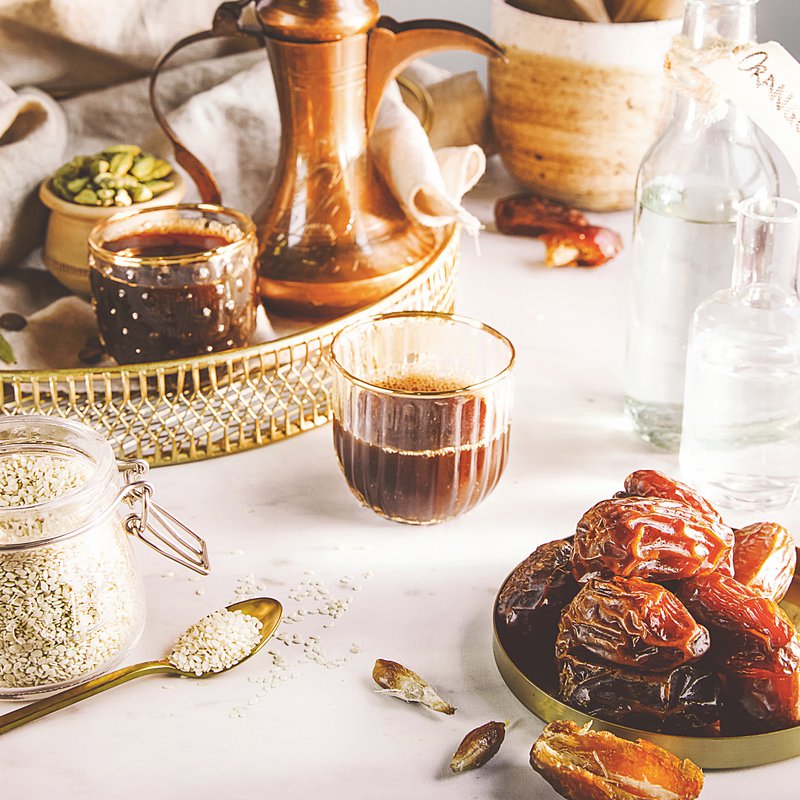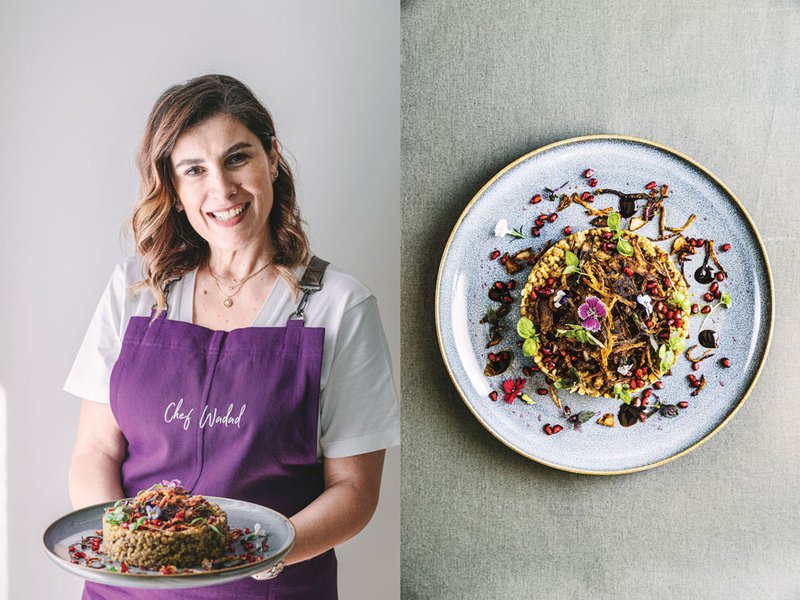
WADAD ZARZOUR, CHEF AND TV HOST
An array of mouth-watering viennoiseries and fresh orange juice greeted us upon entry to chef Wadad’s Dubai home one balmy November morning – and, after spending some time with the acclaimed TV and culinary personality, it became clear where her welcoming nature comes from: her mother, a woman who loves food, cooking and entertaining.
Besides her mother’s 100-guest gatherings, chef Wadad, or chef Woodz as she’s known, spent her childhood around fresh seasonal produce in her hometown of Zahlé, Lebanon. Her family makes the most of their land’s generous crops to prep their mouneh in time for winter: “Autumn makes me miss being home with my mom,” she says. “She taught me a lot about food.” Essentials like vinegar using the grapes from the garden and organic olive oil made from the olive tree in their front yard were always within arm’s reach in her family home.
Chef Woodz vividly remembers helping her mother make “unconventional” jams using aubergines (with clove and cinnamon), pumpkins and balah (yellow Barhi dates). The end-of-year season also reminds her of a treasured childhood dish, fajoum, a Zahlawi version of the Brazilian black bean stew, feijoada: “It’s the favourite of my mom’s recipes. She uses extremely tender meat that melts in your mouth.”
Her mother’s teachings heavily influenced her cooking and her relationship with food: “My mother has been by my side through every life milestone,” says Wadad. “She gave me the confidence to pursue what I loved.” Chef Woodz learned to appreciate seasonality and understands the importance of spices, which she orders from an online store specialising in Lebanese goods. “Even if a dish is not typically Lebanese, I always find a way to bring it back to what I grew up eating,” she says. “I use ingredients we have in Zahlé like sumac and sharab el hosrom (sour grape molasses).”
And one dish she absolutely loves is mujaddara, a lentil-based stew, which she adds a Zahlawi twist to, as shown here in her perfectly plated dish. She uses bulgur instead of rice, just like how her mother always made it: “My mom cooks a lot with lentils and she used to make this dish for us on Fridays without fail.” Making it her own, she adds an extra drizzle of olive oil as well as a generous helping of extra crispy fried onions to top it off.
Lentils and bulgur
Try chef Wadad's Zahlawi spin on a Middle Eastern lentil stew
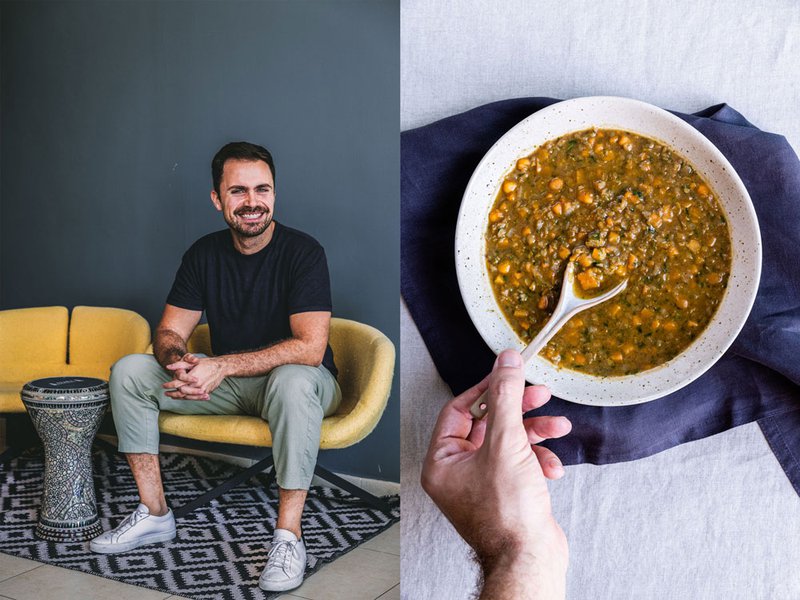
AHMAD HALAWA, CHEF AND SUPPER CLUB HOST
Amman, Jordan – A blond, blue-eyed five-year-old sneaks a potato and charcoal into his parents’ backyard. He digs a hole in the ground, strategically tucks in the ember and spud, patches up the hole and waits patiently. Two hours later, he unearths a perfectly slow-roasted potato: a moment that marked the beginning of Levantine chef and supper club host Ahmad Halawa’s passion for food.
Born in Kuwait and raised in Jordan, chef Halawa is the youngest of five and grew up exploring his independence early on with the kitchen as his playground: at 11 years old, he was making omelettes for breakfast, and by the time he turned 15, he was dishing out intricate woks with his older brother, Munther.
Chef Halawa has since hosted thousands of guests over delicious Levantine food in his Dubai townhouse. Two years into his supper club, which he started after attending one himself, chef Halawa hopes to continue to represent Palestine through food and to honour his family’s traditions and heritage in a noble way. “Palestinian cuisine is something I’m extremely proud of [...] and want to communicate to as many people as possible.”
His supper clubs also act as a space for people from all walks of life to bond over a meaningful conversation and a wholesome plate of Levantine fare.
Although self-taught, the chef owes his culinary prowess to his parents from Nablus, Palestine. On the one hand, his mother, “the source of all flavours,” is a purist in the kitchen and lives by a ‘no ifs, ands, or buts’ policy when recreating beloved family dishes passed down from her mother. On the other hand, his father is more experimental and can juggle effortlessly “between many cuisines”.
“My culinary technique is a mix of both my parents’. I add small twists to Palestinian dishes I grew up on while respecting the integrity of the recipe,” says chef Halawa.
One of his favourite dishes has to be his mother’s incomparable ‘makloubet jazar’. She replaces cauliflower or aubergines with carrots, which, when caramelised, add a delicious sweetness that enhances the flavour of the onions. “I hope to recreate this dish in my supper club one day. It’s very special to me,” says Halawa.
Like many people from the Middle East, Halawa grew up on local adaptations of dishes shared across the region, like his mother’s mujaddara (lentil and rice stew with caramelised onions), which she’d prepare on days that call for a quick, reliable and delicious meal. Lentils played a big role in his childhood and regularly appear on his supper club’s Ramadan menu. He highlights them here in his extra-nourishing version of his mother’s red lentil soup, in which he uses homemade beef bone broth as an antioxidant-rich base to his “super soup” and adds sweet potatoes for depth of flavour and nutritional boost.
Super soup
Chef Halawa's highly nutritious lentil soup inspired by his mum's recipe
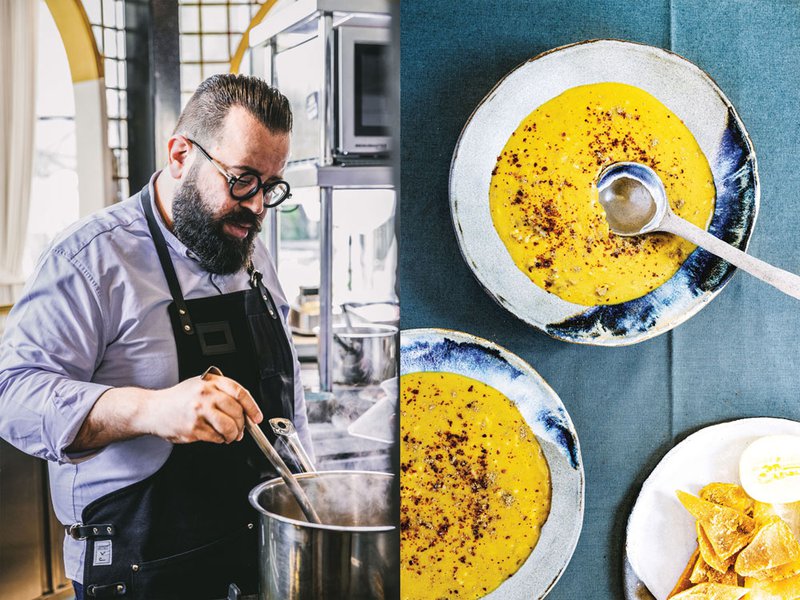
MOHAMAD ORFALI, CHEF AND CO-FOUNDER OF ORFALI BROS BISTRO
Behind chef Mohamad Orfali’s remarkable beard and WALL-E-inspired thick rimmed glasses is a young man from Aleppo, Syria, who took a chance on himself and enrolled in culinary school despite familial and societal prejudice. Fueled by curiosity and a love for food, Orfali slowly leaned into his craft with little expectation of himself.
His road to culinary mastery wasn’t necessarily smooth, but Orfali was able to to build a successful culinary career, notably his experiential venture in collaboration with his brothers Wassim and Omar, the appropriately named Orfali Bros Bistro, which truly is an epicurean’s dream.
Orfali may not have necessarily learned how to cook from his mother, but he did grow up on her “immensely flavourful” food, like mahshi (squash stuffed with minced meat), freekeh (roasted wheat served with chicken and toasted nuts) and kibbeh safajaliyeh (made with quince and pomegranate juice), “I miss my mom’s cooking, it’s my comfort zone,” he reminisces, adding, “she cooks wonderfully.”
At his restaurant, Orfali takes Syrian and Middle Eastern staples and injects them with a dash of modern flair and textural layers; think reimagined ‘tabbouleh’ and Asian-inspired ‘shish barak’. His modern-traditional approach to food would be impossible if not for his grasp of the classics ingrained in him thanks to decades of eating his mother’s cooking. “My mom keeps the integrity of the recipe and cooks like in the old days,” he recalls.
Orfali is grateful for what the region has to offer in terms of ingredients and culinary inheritance: “Food travels with the human being and people take their culinary heritage wherever they go,” explains Orfali. “Each country in the Middle East offers a subtle nuance to the same cuisine.”
The latter explains why it is difficult to distinguish between a Syrian mujaddara and a Lebanese mujaddara, for instance: “It’s all rice, onions and lentils.” One Middle Eastern lentil recipe that chef Orfali is nostalgic for is makhlouta, a mixed grain soup that both his mother and their upstairs neighbour, “Khalto Emm Mohammad”, used to make. “Food is extremely interlinked with memories, with what and who you grew up with.” In true Middle Eastern fashion, countless versions of the simmered soup exist, but Orfali prefers blending his lentils into a velvety, scoopable, canary yellow mixture laced with lemon, cumin and Aleppo pepper.
Tried and true
Make chef Orfali's lime-laced version of a classic Middle Eastern lentil recipe
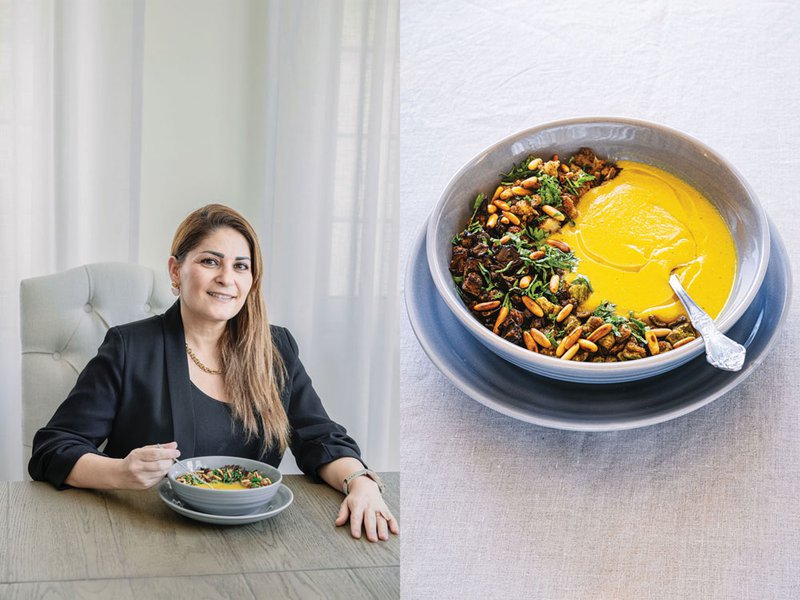
DIMA AL SHARIF, AWARD-WINNING AUTHOR AND FOUNDER OF MOONEH LLC
Multi-award-winning author and food artisan Dima al Sharif was born into a family of food: her grandfather, a former merchant who emigrated from Jerusalem, Palestine, is a prominent farm owner in Jordan. Her paternal grandmother spent every season making mooneh for all 12 of her children with the help of her daughters and other women, forming a sisterhood surrounding food. Her maternal grandmother taught her that food spoke for a person’s identity and heritage. Finally, Dima’s mother, the known cook of the family, taught her culinary techniques.
Much to her mother’s dismay, Dima was first at odds with the idea of cooking growing up. “I wasn’t going to allow society to restrict me to a certain gender role,” she says, adding, “I always had a good relationship with food but not necessarily the cooking part.”
It wasn’t until she was living in Bahrain, and after having given birth to her first child, that something changed. Her visiting mother discreetly left a suitcase full of age-old family recipes, each with a note that tied to a moment in Dima’s life: “I thought, ‘goodness me, this is my life story told through flour and sugar’.”
That moment ignited Dima’s newfound purpose: to share the importance of food and heritage with the world.
In 2013, as an ode to her paternal grandmother, she founded Mooneh LLC, a socially conscious Dubai-based business that makes and sells artisanal organic food products using local produce. “Mooneh sums up who I am and how I think,” says Dima. “We’re bringing back to life ingredients that are long gone and forgotten through a story and a thought in every jar.”
In 2015, she published the award-winning book Plated Heirlooms: Stories & Recipes Through Generations of Palestinian Cooking, in which she illustrates the story of Palestine through its people, culture and cuisine – which wouldn’t have been possible if not for her deep conversations about culture and food with her maternal grandmother. “The information was there, but nobody knew about it,” she says.
One ingredient that Dima brings back is the often overlooked lentils, which she considers one of the primary ingredients of life. She says, “At some point, we all had to grow lentils for science class to understand how life works.”
She ensures she feeds her kids lentils to keep them in touch with their roots. “They must relate to a thread of generations who grew up on this food,” she says, adding, “This is who we are.”
Season's eatings
When life gives you lentils, make Dima al Sharif's traditional red lentil soup
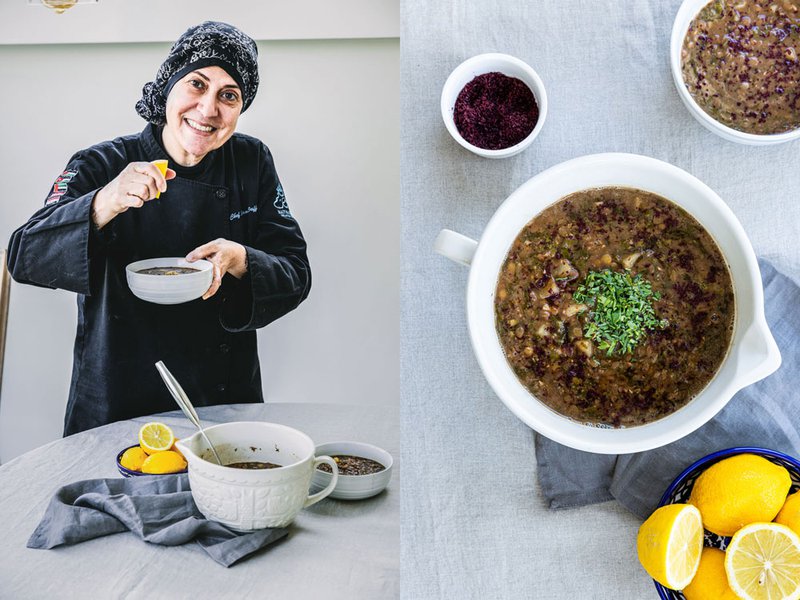
SALAM DAKKAK, CHEF AND OWNER OF BAIT MARYAM
To restaurant owner and chef Salam Dakkak, ‘home’ is in Jordan, where she grew up in a community of loving neighbours, wandering the streets run by liquorice and sahlab (Middle-Eastern milk pudding) vendors. It is also in her parents’ home country of Palestine, where a childhood memory is relived through every bite of falafel and sip of tea.
Today, chef Salam finds a new home in her JLT restaurant Bait Maryam, named after her beloved late mother. She makes it her mission to harbour a space for people to go to when they’re feeling homesick and craving salt-of-the-earth Levantine food. “The food, the décor, the people; it feels like you’re hanging out in someone’s home,” she says. “Our staff and customers became family.” Family means everything to the chef; her mother’s belongings, like her kibbeh mortar (jurn) and sewing machine, are proudly displayed in the restaurant.
The youngest of six, chef Salam spent a decade with her mother after her older siblings moved away from home. Her mother’s influence on her approach to food and life became increasingly more apparent in the way she cooks and runs her business. “Sometimes it feels like it’s her hands doing the chopping, not mine,” she says. “I am an extension of her; I am Maryam’s daughter.” Maryam’s daughter she is indeed: chef Salam lives by her mother’s philosophy “menha wa ilayha”, which means to always stay true to yourself. “She taught me to live peacefully and never leave room for hate,” the chef remembers in fondness. “There’s nothing lovelier than our country, our land, our people.”
She hopes her guests experience the authenticity of her food in every dish served at Bait Maryam, like in her hearty lentil soup with chard, a family heirloom that she made for us here. “Lentils are a people’s ingredient,” she says. “It’s accessible to everybody and can be used in many ways.”
A family heirloom
Enjoy chef Salam's celebration of her roots with an inherited lentil soup recipe

